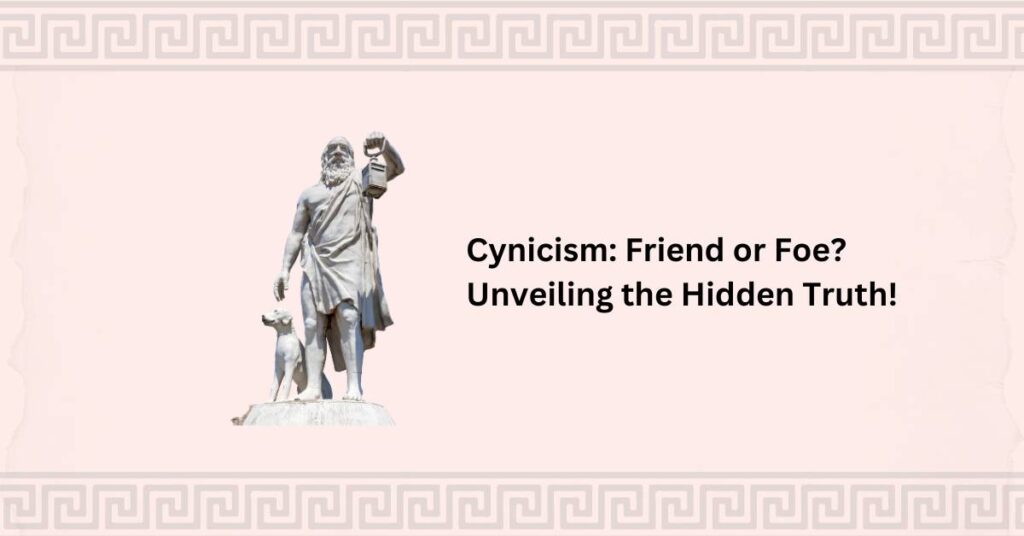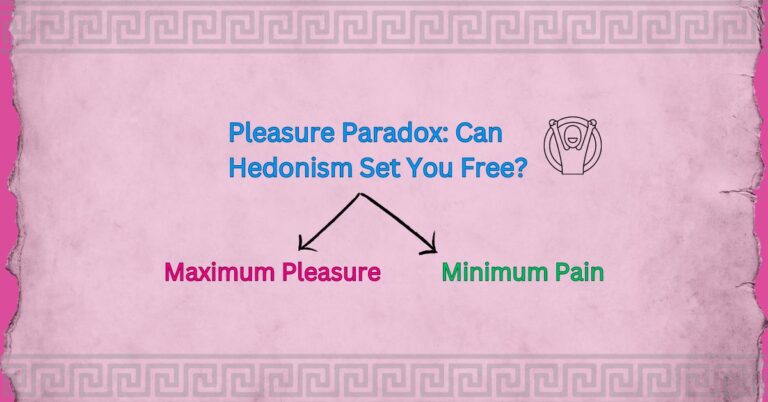Cynicism: Friend or Foe? Unveiling the Hidden Truth!
Cynicism often gets a bad rap, but what really lies behind this perspective? At its core, cynicism involves questioning motives, expecting little from others, and often seeing the glass as half empty. This outlook, while seemingly negative, taps into deeper societal and personal questions.
Why does this matter today? In our fast-paced, digital world, skepticism can be a shield or a hindrance, depending on how we use it. From social media interactions to political debates, a cynical view can either protect us or isolate us.
In this blog, we’ll explore the roots of cynicism, how it manifests in modern times, and its psychological impacts. We’ll also delve into what drives a person to adopt this mindset and the effects it can have on daily life. Plus, we won’t leave you hanging; we’ll offer some practical steps for balancing healthy skepticism with a positive outlook. Ready to peel back the layers of cynicism with me? Let’s get started.
The Historical Perspective of Cynicism:
Definition of Cynicism in Classical and Modern Contexts
Initially, cynicism emerged as a school of ancient Greek philosophy that championed a radical form of virtue. Followers like Diogenes of Sinope pursued a life stripped of societal luxuries, focusing solely on living in virtue and in accordance with nature. This classical cynicism emphasized moral integrity and the importance of being self-sufficient, challenging the need for wealth, power, or social status.
The Origins of Cynicism: Ancient Greek Philosophy
Diogenes of Sinope, often considered the archetype of classical cynicism, embraced a lifestyle that blatantly defied societal norms to make a point about virtue and authenticity. His notable antics, such as carrying a lantern during the day, symbolized his quest for truth amidst the darkness of ignorance and pretense. This act wasn’t just for show—it questioned the integrity and values of those around him, suggesting that true honesty was hard to find.
Evolution of the Term Through History
As centuries passed, the philosophical principles of cynicism gradually lost their original contours, morphing into what we recognize today as a more general attitude of skepticism and distrust. Modern cynicism is less about living in poverty or challenging societal norms and more about an attitude marked by a general mistrust of others’ motives. It often assumes that people are motivated by selfish desires rather than by good intentions. This contemporary form of cynicism can be seen in various aspects of modern life, from cynical portrayals in media and literature to skeptical views of political and corporate motives.
This evolution reflects a shift in societal structures and philosophies, illustrating how historical and cultural contexts can transform philosophical doctrines into widespread social attitudes.
Cynicism in Modern Times:
Modern Cynicism vs. Its Philosophical Roots
While classical cynicism promoted living in virtue and simplicity, modern cynicism has diverged significantly from these origins. Today’s cynicism is not about seeking truth through a minimalist lifestyle but rather manifests as a defensive, often pessimistic attitude toward others’ intentions. This shift from a philosophical lifestyle to a pervasive societal attitude highlights a deep-seated skepticism about the authenticity and motives of others, replacing the ancient focus on personal integrity and societal critique.
The Rise of Cynicism in Contemporary Culture and Media
Cynicism has woven itself into the fabric of contemporary culture, notably through media portrayals that emphasize irony, skepticism, and a distrust of traditional institutions. In films, television, and literature, characters often display a cynical attitude, doubting the goodness in others and expecting the worst outcomes. This not only reflects but also reinforces the audience’s own suspicions and doubts about the world around them.
Examples from Politics, Entertainment, and Social Media
In politics, cynicism surfaces through voter apathy and the widespread belief that politicians are inherently dishonest or self-serving. This perspective dampens public engagement and fuels a disconnection from democratic processes.
Entertainment often mirrors or satirizes this distrust. Shows like “House of Cards” exemplify how cynicism about political motives can be a central theme, presenting a world where manipulation and power plays are the norm rather than the exception.
On social media, cynicism appears in the widespread skepticism users show towards information, questioning the authenticity of everything from news to personal posts. Memes, which often incorporate irony and satire, also reflect and propagate a cynical view of social and political issues, spreading quickly and influencing public opinion.
Each of these examples illustrates how deeply cynicism is embedded in our daily interactions and societal functions, influencing and shaping public discourse in significant ways.
Psychological Impact of Cynicism:
Impact of Cynicism on Mental and Emotional Health
Cynicism can take a toll on one’s mental health. Carrying a constant suspicion or expectation of the worst not only diminishes joy and satisfaction but can also lead to chronic stress. This continuous stress response can trigger physical and emotional exhaustion, making individuals more susceptible to a range of health issues, from heart disease to weakened immune function.
Relationship Between Cynicism, Depression, and Anxiety
There’s a documented link between high levels of cynicism and an increased risk of developing depression and anxiety. Cynicism often isolates individuals, as their distrust in others’ intentions can prevent them from forming supportive, fulfilling relationships. This isolation can exacerbate feelings of loneliness and anxiety, creating a vicious cycle where cynicism feeds into these mental health conditions and vice versa.
Social Impact of Cynicism: Trust, Relationships, and Community Involvement
Socially, cynicism can erode the foundation of trust that relationships and community networks are built upon. When individuals assume the worst in others, it hinders their ability to collaborate, communicate effectively, or engage in community activities. This breakdown in trust can lead to weaker social bonds and a less cohesive community, impacting everything from personal relationships to broader social cohesion.
For instance, a cynical attitude within a neighborhood might lead to lower participation in local events or civic duties, as people may feel these efforts are pointless or self-serving on the part of the organizers. This detachment not only affects individual well-being but also stifles collective action that could benefit the entire community.
Causes and Triggers of Cynical Views:
What Leads Individuals to Adopt Cynical Perspectives?
Adopting a cynical perspective often stems from repeated disappointments and negative experiences. When individuals face consistent betrayals, failures, or unmet expectations, they may begin to adopt a protective stance, assuming the worst to avoid further disappointment. This defensive mechanism, though initially helpful, can solidify into a persistent cynical outlook over time.
Role of Societal Disillusionment and Personal Experiences
Societal disillusionment plays a significant role in fostering cynicism. When public institutions, leaders, or societal systems repeatedly fail to uphold promises or act ethically, individuals lose faith in these entities’ integrity and effectiveness. This disillusionment is often compounded by personal experiences of injustice or inefficiency, leading to a broader, more generalized distrust in all forms of authority or communal systems.
Influence of Media Consumption on Cynicism
The media we consume profoundly impacts our worldview, and in today’s age of information overload, it’s a significant catalyst for cynicism. Constant exposure to negative news, biased reporting, and sensationalism can skew our perception of reality, leading us to expect the worst in most situations. Additionally, the irony and satire prevalent in much of contemporary entertainment reinforce a cynical view of the world as flawed and corrupt. This continuous feed of cynicism from various media sources shapes how we interpret events and interactions in our daily lives, reinforcing a cycle of skepticism and mistrust.
Consequences of Cynicism:
Negative Effects on Personal Life and Professional Environments
Cynicism can significantly impair personal and professional relationships. In personal life, a cynical attitude may lead to conflicts, misunderstandings, and a general lack of emotional connection with others. Cynics often struggle to form deep, meaningful relationships, as their constant suspicion can be off-putting to others and prevent genuine intimacy.
In the workplace, cynicism can undermine teamwork and cooperation. Cynical employees may be less likely to engage in collaborative projects or support their colleagues, assuming that others are motivated by self-interest rather than the common good. This attitude can stifle innovation and productivity, creating a toxic work environment where distrust and disengagement are rampant.
Impact on Societal Progress and Social Interactions
Cynicism poses a real threat to societal progress. When widespread, it diminishes public participation in democratic processes and community initiatives, as people believe their efforts won’t make a difference or suspect corrupt motives behind civic activities. This withdrawal can halt progress on social issues as fewer people engage in constructive dialogues or community-building efforts.
Social interactions also suffer in a cynical climate. Communities fragmented by distrust struggle to unite for common causes or support each other in times of need. The fabric of society weakens when individuals retreat into self-protection, viewing others with suspicion rather than as allies or friends.
Studies and Research Findings on Cynicism’s Impact
Research supports the detrimental effects of cynicism on health, happiness, and societal welfare. Studies have linked high levels of cynicism to increased risks of cardiovascular disease and diminished overall health due to stress and negative emotions. Other research has shown that cynical individuals often experience poorer quality relationships and reduced life satisfaction.
Moreover, sociological studies indicate that societies with high levels of cynicism face challenges in governance, social cohesion, and economic stability. This body of evidence underscores the need to address the root causes of cynicism and find ways to foster a more trusting, optimistic outlook among individuals and communities.
Overcoming Cynicism:
Strategies for Reducing Cynicism in Daily Life
To combat cynicism effectively, one can start by consciously identifying and challenging negative thoughts. Whenever you catch yourself expecting the worst, pause and consider alternative, more positive possibilities. Practice gratitude regularly; recognizing and appreciating the good in your life can shift your focus away from pervasive negativity.
The Importance of Empathy, Open-mindedness, and Positive Social Engagements
Empathy and open-mindedness are crucial antidotes to cynicism. By trying to understand others’ perspectives and motives without pre-judgment, you open the door to more meaningful and less biased interactions. Engaging positively in your community or social groups can also reinforce the benefits of mutual support and collective effort, which can directly counter feelings of distrust and isolation.
Tips for Maintaining a Healthy Perspective and Avoiding Cynical Traps
- Seek diverse viewpoints: Expose yourself to a wide range of opinions and experiences, which can help you see beyond a narrow or overly negative outlook.
- Limit exposure to negative media: Be mindful of the amount of negative news and entertainment you consume. Balance it with positive content and activities that uplift your spirit.
- Cultivate positive relationships: Surround yourself with supportive and optimistic people. Positive social interactions can lessen cynicism and foster a more hopeful outlook.
- Engage in volunteer work: Helping others can provide a more realistic perspective on the world, highlighting the positive aspects and the difference one individual can make.
- Practice mindfulness and stress reduction techniques: Activities like meditation, yoga, or even regular exercise can improve your mental clarity and reduce the stress that feeds cynicism.
Implementing these strategies can help shift away from a cynical mindset towards a more balanced and positive outlook, enhancing both personal well-being and contributing to a healthier, more constructive community environment.
Cynicism and Its Role in Critical Thinking:
Balancing Skepticism and Openness
Achieving a balance between healthy skepticism and openness is key to maintaining a constructive perspective. Skepticism can be beneficial when it encourages you to question and verify information, leading to informed decisions. However, it’s important to couple skepticism with openness — the willingness to consider new ideas and change your mind in light of the evidence. This balanced approach prevents the descent into disabling cynicism and promotes a more nuanced understanding of complex issues.
Positive Aspects of Cynicism as a Defense Mechanism and Critical Analysis Tool
Cynicism isn’t all bad; it can serve as an effective defense mechanism. In situations where deceit is common, a cynical outlook can protect you from being exploited or harmed. Furthermore, cynicism can be a powerful tool for critical analysis. It encourages questioning the status quo and probing deeper into the motives behind people’s actions and societal norms. This critical stance can unearth underlying problems and lead to solutions that might otherwise be overlooked.
Using Cynicism Constructively in Problem-Solving and Decision-Making
To harness cynicism constructively, use it to challenge assumptions rather than to dismiss opportunities outright. For example, in a business setting, a cynical approach might prompt you to rigorously evaluate the risks of a new venture. This can lead to better preparedness and strategic planning. In personal decisions, applying a dose of cynicism can help you weigh the pros and cons more critically, leading to choices that are well-thought-out and less influenced by mere emotion or impulse.
In problem-solving, let your cynical side ask tough questions or play devil’s advocate. This can illuminate potential pitfalls and stimulate more thorough analysis. However, it’s crucial to remain open to positive outcomes and constructive solutions, ensuring that cynicism acts as a catalyst for improvement rather than an obstacle to progress.
Balancing this perspective means constantly recalibrating your level of trust and skepticism, ensuring that you remain protective of yourself without closing off potential opportunities for growth and positive interactions.
Conclusion:
In conclusion, understanding and managing cynicism is crucial for maintaining healthy interpersonal relationships and a positive outlook on life. Throughout our discussion, we’ve delved into the roots of cynicism, identifying it as not merely a fleeting sentiment but often a deep-seated worldview that can affect one’s interactions and decisions. This perspective is typically characterized by a general distrust of others’ motives, believing that people are primarily motivated by self-interest.
To manage cynicism constructively, it’s important to foster self-awareness and consider alternative, more positive interpretations of others’ actions. Techniques such as cognitive restructuring can be instrumental in challenging and changing overly negative thoughts. Moreover, engaging in empathy-building activities, such as active listening and perspective-taking, can also diminish cynical views and promote a more compassionate outlook towards others.
As we wrap up, I encourage you to reflect on your own views and behaviors. Ask yourself how often you assume negative intentions in others and consider whether this impacts your relationships and overall happiness. By acknowledging and adjusting these patterns, you can cultivate a more trusting and open attitude towards the world around you.
Take this opportunity to not only reflect but to act. Perhaps initiate conversations with those you trust about perceptions and experiences, or consider professional guidance if you find cynicism deeply ingrained. Each step you take is a move towards a more understanding and less cynical approach to life.



